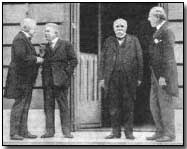Definition of ‘Bank For International Settlements – BIS’
An international organization fostering the cooperation of central banks and international monetary policy makers. Established in 1930, it is the oldest international financial organization, and was created to administer the transaction of monies according to the Treaty of Versailles. Among others, its main goals are to promote information sharing and to be a key center for economic research.
organization, and was created to administer the transaction of monies according to the Treaty of Versailles. Among others, its main goals are to promote information sharing and to be a key center for economic research.

A HISTORY OF CENTRAL BANKING IN THE UNITED STATES
Nearly every country around the world, and certainly every developed industrial nation, has a central bank. Most serve one or more of the following functions: acting as a bank for bankers, issuing a common currency, clearing payments, regulating banks and acting as a “lender of last resort” for banks in financial trouble. The one thing they all do is serve as banker to their own governments.
But even though these central banks have common functions, each still operates in distinct ways, and those distinctions largely stem from the banks’ historical foundations. If you want to understand the nature of a modern central bank, you have to study its history and relationship to commerce and government. This is especially true of the United States, where the Federal Reserve System’s unique structure has been shaped by this country’s earlier experiments with central banking, and by the political response to those experiments. Indeed, the Federal Reserve itself has changed in profound ways since it was signed into law in 1913. more
The main article below was taken from http://www.bilderberg.org/bis.htm
Ruling the World of Money
by Edward Jay Epstein -1983 Harpers Magazine
reprinted from Monetary Reform Magazine – Canada
website: http://www.monetary-reform.on.ca/main.shtml
email: editor@monetary-reform.on.ca
TEN TIMES A YEAR – once a month except in August and October – a small group of well dressed men arrives in Basel, Switzerland. Carrying overnight bags and attaché cases, they discreetly check into the Euler Hotel, across from the railroad station. They have come to this sleepy city from places as disparate as Tokyo, London, and Washington, D.C., for the regular meeting of the most exclusive, secretive, and powerful supranational club in the world.
Each of the dozen or so visiting members has his own office at the club, with secure telephone lines to his home country. The members are fully serviced by a permanent staff of about 300, including chauffeurs, chefs, guards, messengers, translators, stenographers, secretaries, and researchers. Also at their disposal are a brilliant research unit and an ultramodern computer, as well as a secluded country club with tennis courts and a swimming pool, a few kilometres outside of Basel.
The membership of this club is restricted to a handful of powerful men who determine daily the interest rate, the availability of credit, and the money supply of the banks in their own countries. They include the governors of the U.S. Federal Reserve, the Bank of England, the Bank of Japan, the Swiss National Bank, and the German Bundesbank. The club controls a bank with a $40 billion kitty in cash, government securities, and gold that constitutes about one tenth of the world’s available foreign exchange. The profits earned just from renting out its hoard of gold (second only to that of Fort Knox in value) are more than sufficient to pay for the expenses of the entire organization. And the unabashed purpose of its elite monthly meetings is to coordinate and, if possible, to control all monetary activities in the industrialized world. The place where this club meets in Basel is a unique financial institution called the Bank for International Settlements – or more simply, and appropriately, the BIS (pronounced “biz” in German).
Research at BIS
The BIS carries out research and analysis to contribute to the understanding of issues of core interest to the central bank community, to assist the organisation of meetings of Governors and other central bank officials and to provide analytical support to the activities of the various Basel-based committees.The BIS also comments on global economic and financial developments and identifies issues that are of common interest to central banks. The research agenda of the BIS is focused on key areas of interest to central banks, such as monetary and financial stability, monetary policy and exchange rates, financial institutions and infrastructure, financial markets, central bank governance, and legal issues. http://www.newsnet14.com/?p=119370

No comments:
Post a Comment